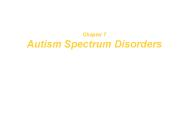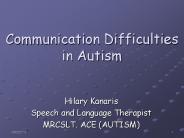Echolalia PowerPoint PPT Presentations
All Time
Recommended
Echolalia is the act of repeating another person’s words, either right away or later. Although echolalia is a distinct stage of language development, it usually ends by the time a child is three years old and has more advanced language abilities.
| PowerPoint PPT presentation | free to download
... to remediate echolalia ... child responded with echolalia, clinician used a carrier phrase in ... Echolalia and meaningfulness were unpredictable across ...
| PowerPoint PPT presentation | free to view
AUTISM AND BILINGUALISM Echolalia has also been used to teach receptive ... COGNITIVE AND SOCIAL FACTORS INFLUENCING ECHOLALIA Transitions (Prizant, 1983 ...
| PowerPoint PPT presentation | free to download
Echolalia, self-stimulation, restricted/intense interests, aggression, self-injury ... Echolalia. Problems answering questions. Difficulty conversing ...
| PowerPoint PPT presentation | free to view
echolalia, cluttering. Fragile X Syndrome: Social impairments (Turk & Graham, 1997) ... delayed echolalia. repetitive speech. hand flapping. gaze aversion ...
| PowerPoint PPT presentation | free to view
In echolalia, the tone and accent of the speaker is repeated as well. Think of echolalia as being like something a parrot does, in terms of speech repetition.
| PowerPoint PPT presentation | free to download
Onset of Autism: prior to 36 months ... Stereotypical/idiosyncratic use of language (e.g., echolalia, scripting) ... emergence of echolalia and stereotyped language ...
| PowerPoint PPT presentation | free to view
Echolalia. should be encouraged initially as legitimate communicative acts ... Echolalia, continued. use facilitative style, use positive responses ...
| PowerPoint PPT presentation | free to view
Indicated by abnormal disturbances in muscular movement (Catatonia) ... Choose not to speak (elective mutism) Echolalia mimic others speech ...
| PowerPoint PPT presentation | free to download
Restrictive/repetitive behaviors and interests ... Demonstrates echolalia. Throws prolonged or frequent tantrums. Is hyperactive ...
| PowerPoint PPT presentation | free to download
Developmental Disorders. Attention Deficit/Hyperactivity Disorder (AD/HD) ... Echolalia) lack of imaginative play. Symptoms (cont. ...
| PowerPoint PPT presentation | free to view
Brain regions - Areas of Interest. Glutamate and Serotonin ... Kanner echolalia, difficulties with pronouns, repetitious behaviour ...
| PowerPoint PPT presentation | free to view
Katherine M. Bunte, M.S., BCBA. Pervasive ... Markedly impaired expression of pleasure in other people's happiness ... Echolalia. Idiosyncratic language ...
| PowerPoint PPT presentation | free to view
A clinically significant behavioral or psychological syndrome or pattern that ... Disturbances in 'conation' (echolalia, echopraxia, tics, compulsions, ritualism) ...
| PowerPoint PPT presentation | free to view
(McKelvey, Lambert, Mottron, & Shevell, 1995) Research: Early Indicators of Asperger Syndrome ... ADAM & MATTHEW. Repetitive language: Immediate echolalia. Minimal ...
| PowerPoint PPT presentation | free to view
Definition-An absorption in fantasy to the complete ... Echolalia. Nominal Aphasia. Neologisms. Labile Mood. Intervention Management. Behavior Modification ...
| PowerPoint PPT presentation | free to view
In providing opportunities for echolalia so that the child might be given ... techniques and might result in an echolalia of sorts in these gestures. ...
| PowerPoint PPT presentation | free to view
Introduce data from the largest epidemiological/standardization ... not limited to: mutism, echolalia, pronoun reversal, literalness, poor social language. ...
| PowerPoint PPT presentation | free to view
a result of an emotional disorder. a mental illness ... Echolalia repeating words but not responding to their meaning. Pronoun reversal ...
| PowerPoint PPT presentation | free to view
Autistic Disorder - marked by three defining features, with onset before age: 1) ... Echolalia is common. among those who do talk ...
| PowerPoint PPT presentation | free to download
Present a framework for supporting individuals. with a variety of needs ... From echolalia to creative language. From unconventional to conventional language ...
| PowerPoint PPT presentation | free to view
'J' made limited eye contact and exhibited significant echolalia. Case #2 ' ... 'D' made limited eye contact and exhibited mild echolalia. PROTOCOL. Case #1 ...
| PowerPoint PPT presentation | free to view
They may run, be unresponsive, aggressive, or just act strange. ... Non-verbal (50%), echolalia. Don't understand 'hidden curriculum' ...
| PowerPoint PPT presentation | free to view
4.Grossly disorganized or catatonic behavior ... POSITIVE SYMPTOMS DELUSIONS, HALLUCINATIONS, FORMAL THOUGHT DISORDER ... Echolalia or echopraxia. Disorganized Type ...
| PowerPoint PPT presentation | free to view
Coprolalia involuntarily shout obscenities. Echolalia repeat words of other people ... Facial tics such as eye blinking, nose twitching, neck stretching, ...
| PowerPoint PPT presentation | free to view
6th International Conference on the Care and Treatment of Offenders with a ... and persistent demands, echolalia, compulsive behaviour, Social isolation. ...
| PowerPoint PPT presentation | free to view
To present a case which illustrates the diversity and complexity of cases ... Some echolalia 'Can I have chocolate, can I have chocolate, chocolate, chocolate' ...
| PowerPoint PPT presentation | free to view
2:20-3:00 p.m. Understanding the characteristics and needs of children/youths ... Inappropriate laughing and giggling, echolalia, not responsive to verbal cues ...
| PowerPoint PPT presentation | free to view
Autism Spectrum Disorders (ASDs) and Pervasive Developmental Disorders (PDDs): Characteristics ... Period of using echolalia. Delayed. Immediate ...
| PowerPoint PPT presentation | free to view
Autism is a brain disorder that typically affects a person's ability to ... a combination of functional speech, jargon, and immediate/delayed echolalia ...
| PowerPoint PPT presentation | free to view
Presence of hallucinations and delusions. Loss of ego boundaries ... disturbances (immobility, excessive activity, mutism or echolalia, or peculiar movements) ...
| PowerPoint PPT presentation | free to view
These are the building blocks for the mood D/Os. They themselves are not coded, ... Mutism. Other peculiarities of voluntary movement. Echolalia. Echopraxia ...
| PowerPoint PPT presentation | free to view
The Southern California Autism Training Collaborative (SCATC) has provided ... Echolalia. Poor receptive/expressive language. Oral motor difficulties apraxia ...
| PowerPoint PPT presentation | free to view
AAMR describes individuals in terms of intensity of support to function ... echolalia, jargon, telegraphic speech, missing morphologic features, and limited ...
| PowerPoint PPT presentation | free to view
For 2-month-old infants, 'out of sight' is 'out of mind,' A 1-hour-old infant may imitate an adult ... Echolalia repetition of vowel/consonant combinations ...
| PowerPoint PPT presentation | free to view
There is not one essential symptom that must be present for a ... activity, extreme negativism or mutism, peculiar voluntary movement, echolalia or echopraxia ...
| PowerPoint PPT presentation | free to view
STRANGE, RARE, AND PECULIAR KIDS. What Every Homeopath Needs to Know to ... Rigid kids, such as math savants, may need a ... echolalia. bedwetting. Want ...
| PowerPoint PPT presentation | free to view
Basic facts about autism (very brief) Tips for engaging a student with autism ... Unusual linguistic features (e.g., echolalia, neologisms, odd prosody) ...
| PowerPoint PPT presentation | free to view
The disorder was first recognized by Leo Kanner, a psychiatrist at John Hopkins ... Echolalia (verbatim repetitions of others) Asperger Syndrome ...
| PowerPoint PPT presentation | free to view
Speech and language abnormalities are common in adult psychiatric disorders ... of content of speech, pressure of speech, perseveration, echolalia and blocking ...
| PowerPoint PPT presentation | free to view
A specific learning disability is a disorder in one or more of the ... Echolalia may develop repeating words or phrases heard, but not initiating communication. ...
| PowerPoint PPT presentation | free to view
Kanner discovered the disorder in 1943 and his name is used to ... has just said (this is known as echolalia) or talking at length about their own interests. ...
| PowerPoint PPT presentation | free to view
T H E A U T I S M S P E C T R U M. Severe Moderate Light ... Echolalia and return of speech. Eating baby food. Kinder- garten. Social & academic difficulties ...
| PowerPoint PPT presentation | free to view
Factors associated with the age of diagnosis among children ... Echolalia. 0.2. 0.5, 0.0. Hand flapping. 0.4. 0.7, 0.1. Toe walking. 0.2. 0.5, 0.1. Spins self ...
| PowerPoint PPT presentation | free to view
about catatonia..a psychiatric feature seen with other disorders
| PowerPoint PPT presentation | free to download
Autism Spectrum Disorder By: Kirsten Schneider, Rachel Brown & Krystle Jordan What is Autism Spectrum Disorder? IDEA Definition: *A developmental disability affecting ...
| PowerPoint PPT presentation | free to download
in people with ASDs. Receptive Language. Typically. ... may read' early (e.g., Wal-Mart, McDonalds) fascination with letters/print ...
| PowerPoint PPT presentation | free to view
Challenging behaviour challenges others - not the person with autism. Is ... social rules within society (classroom, playtime, employment, social arenas, etc. ...
| PowerPoint PPT presentation | free to view
AUTISM Chapter 12 This PowerPoint includes additional information not found in your text Overview What is Autism? Is there more than one type of Autism?
| PowerPoint PPT presentation | free to view
Hen s teeth .... Or not?? NEUROPSYCHIATRIC CONDITIONS IN CHILDHOOD Dr Kirsty Yates Community Paediatrics, GNCH
| PowerPoint PPT presentation | free to download
Developmental Dyspraxia of Speech Larry Burd, Ph.D. Department of Pediatrics 701-780-2477 laburd@medicine.nodak.edu Presentation Typical Presentation: slow clumsy ...
| PowerPoint PPT presentation | free to download
Shows difficulties in the social interaction and communication skills between individuals. ... CARS. CHAT. Autism Screening Questionnaire. Screening Test for ...
| PowerPoint PPT presentation | free to view
Autism. Developmental disability that significantly affects a student's verbal ... Autism occurs in children with all levels of intelligence (gifted to mental ...
| PowerPoint PPT presentation | free to view
First described by Leo Kanner in 1943 as early infantile autism ' ... Today, autism is a severe form of a broader group of disorders ...
| PowerPoint PPT presentation | free to view
Something to communicate about - an awareness of ones needs ... Monotonous or repetitive intonation. Rigid use of language. Literal interpretation of language ...
| PowerPoint PPT presentation | free to download
























































